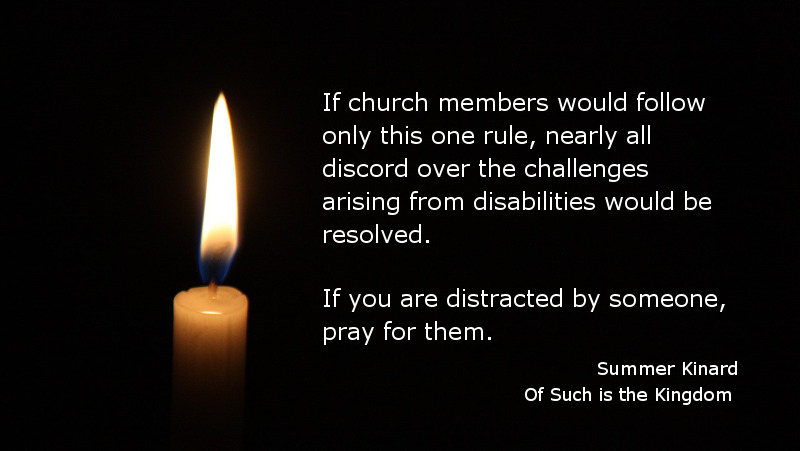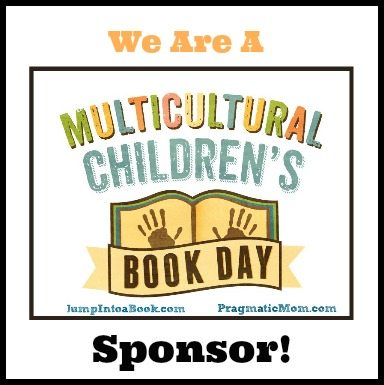If Summer Kinard’s new book, Of Such Is the Kingdom, were a child, I’d be the godmother. The book is not flesh of my flesh; I didn’t suffer the birth pangs. But I walked with Summer while she brought this book to life. I prayed for her fervently, asking God and the saints to help her make the book everything she hoped it would be, everything that families with disabilities need it to be.
Now the book has arrived. And I love it.
So indulge me for a bit, please, while I tell you why you should love it, too.
What kind of book is it?
Summer calls Of Such Is the Kingdom “A Practical Theology of Disability.”
She could have called it a practical guide to welcoming families with disabilities into the Orthodox Church. And it is that, of course. If you’re looking for a step-by-step guide to making services accessible to people with physical disabilities, and to welcoming families with invisible disabilities to your parish, you’ll find what you need to know here.
But there are other such guides. And most of us who come from families with disabilities know that those guides haven’t done much. We have read the books, and shared them, but we have rarely seen the changes they advocate be adopted. As a result, we’re often left feeling lonelier and less welcome.
The difference between Summer’s book and the others I can think of is that Summer planted all of the suggestions in Of Such Is the Kingdom in the soil of patristic theology. She doesn’t just explain what your parish needs to do. She explains why these things are essential to the salvation of every Christian, including both those who are in families with disabilities, and those who are not.
How the book is structured
Of Such Is the Kingdom has four major sections: Kairos, Theosis, Kenosis, and Koinonia. Summer explains in her introduction that we really can’t separate our lives and actions into four neat categories, but the divisions are useful in helping us organize our thoughts about disability in the Church.
Each section contains a number of chapters. Some chapters are theological explorations. Others are straightforward how-to guides. And my favorites are “spotlights” – stories from and about families with disabilities. The spotlight chapters put everything else into perspective, giving flesh to ideas that might otherwise seem impersonal.
Each chapter ends with a bullet-point summary and questions for reflection. If you decide to use Of Such Is the Kingdom in your book group, you’ll appreciate these practical features. (Especially if you don’t have time to read the assigned chapter before your book group meets!)
And, as you would expect in any book of theology, Of Such Is the Kingdom includes an extensive bibliography and thorough end notes.
Let’s take a quick tour through the sections.
Kairos
Kairos is, of course, time. Not chronological time, in which day follows day and year follows year. Kairos is the time that stands outside of chronological time. It is sacred time, time as it exists in the Kingdom of Heaven. It is the time in which God acts, the time that encompasses all time in a single eternal Now. We experience this time, and a foretaste of the Resurrection, in the Divine Liturgy.
Through an exploration of God’s time, Summer explores the meaning of illness and disability. She addresses the attitudes that cause people to be uncomfortable around people with disabilities. She talks about what it takes to welcome people with disabilities into the community of faith.
And, most compellingly, she wonders how the bodies of people with disabilities will be changed in the resurrection in the age to come. Many people without disabilities believe that our resurrection bodies will have no trace of disability. And many people with disabilities believe that, without their disability, they would no longer be themselves.
Reasoning from the Resurrection of our Lord, Summer says:
we know that when we rise again, we will be like the Lord. The Lord bore the wounds of His Passion in His resurrected body. Yet, His body was not disabled in His Resurrection by having been nailed to the Cross. He conquered death in His body and rose in it. It may be that in ways we cannot understand, we are both brought into wholeness in the resurrection and also still show some signs in our bodies of the limitations that we lived with in this life.
Theosis
When Orthodox Christians talk about salvation, we’re talking about theosis: Becoming like God. Summer explains that we work towards theosis by praying, participating in the Sacraments, and practicing virtues.
The Church is the place where we participate in the Sacraments. It is the hospital of souls. But souls enter the church with their bodies, and so the church must be accessible to bodies as well as to souls. At a minimum, people have to be able to get in. If we don’t make way, people would be justified in breaking through the roofs of our buildings. But they won’t do that. If we put barriers in the way, they just won’t come.
Summer offers practical things we can to remove barriers – both physical barriers and social barriers – and to allow people with disabilities to enter our churches.
And then, in five incredible chapters, Summer explains how to teach the Orthodox Christian faith to people of all ages and all abilities. She covers how to gain attention, how to use space as a teaching element, how to teach through the senses, how to create an accessible prayer corner, and how to teach nonverbal children how to pray.
Every Church school director, every Sunday school teacher, everyone who puts together any program of Christian education, should consider Of Such Is the Kingdom chapters 11 – 15 required reading, along with chapter 18 (teaching by creating habits). Use them, and they will make a difference in the lives of all your learners, including those with disabilities.
Kenosis
Kenosis can be a hard idea to wrap your mind around. It means to empty yourself. But of what? And how? And why?
In this section of her book, Summer draws a series of pictures that answer those questions. Kenosis is mutual humility and love. It is graciously serving others, and graciously receiving the service of others. Kenosis is always offered freely and willingly, but not without constraints, because our bodies place constraints on what we can do and on what we can choose.
That’s true of people with disabilities, of course. But it’s also true of people who don’t have disabilities.
In this section, Summer returns to her thoughts on teaching people with disabilities, and she explores forms of prayer that may be more accessible for people with disabilities.
She closes the section with a chapter containing a series of spotlights that focus on children with disabilities offering their service to the Church. Each time, the as both the child and the community empty themselves in humility and love, this mutual self-giving leads to healing and growth for all.
Koinonia
The sacraments, prayer, and virtue are all critical aspects of our life in the church. But, Summer explains, “the inclusion of families with disabilities in the fellowship of the Church is no less important than their inclusion in sacraments, prayer, teaching, service, and leadership.” Feasts and festivals, coffee hour and church school truly matter. We are social creatures, made to be in relationships with God and with each other.
In this section, Summer addresses three issues that come up over and over when you speak with families with disabilities.
The first issue is shushing. The second is scents and incense. The third is food allergies and intolerances.
Shushing
It’s hard to explain how painful shushing can be to families with disabilities. But if you’ve been shushed during a church service, whether by someone standing near you, or by the priest from the ambo, you know the sick feeling of shame and humiliation it brings.
That’s why Summer addresses it forcefully:
The only person who ought to be shushed in an Orthodox Church is the devil when we breathe on him at the beginning of the service of Holy Baptism. Don’t let the serpent hiss out through you when you come to Communion. The head of the snake is being crushed, and God is feeding his children from the Tree of Life. Crush your prideful need to control. Crush your unkindness toward your weaker brothers and sisters. Crush the serpent’s head. Do not hiss with the serpent and frighten the little ones whom Christ has called. There is nothing more repugnant to God than the ill-timed rebuke of children who are coming to Him. Do not do it.
Incense and fragrances
Summer is less forceful in her discussion of incense and fragrances. She acknowledges how important is in our worship, and how meaningful it is to many worshippers. For people whose other senses are impaired, the smell of incense may be their strongest connection to the place where they pray.
And yet there are people who simply can’t be around incense or other strong fragrances. People with sensory sensitivities may find the scents in the nave overwhelming. People with asthma or other breathing disorders may literally be endangered by them.
It’s difficult to balance these competing needs. Difficult, but usually not impossible. By using Summer’s suggestions as a starting point, and working together with humility and compassion, you’ll likely find something that works.
Food allergies
Finally, Summer addresses the issue of food allergies and intolerances. She opens the chapter with an essay by Victoria Marckx, church school director at St. Demetrios Orthodox Church, Winnipeg, Manitoba. In the essay, Victoria explains why and how we can treat people who have food allergies like Christ.
Victoria describes what she does at St. Demetrios to ensure that people with food allergies are safe, and that they feel welcome and loved. Summer adds additional practical tips that she gathered from others who have severe food allergies, and from her own experience.
In conclusion
This is much longer than my usual book review – but then, Of Such Is the Kingdom is much longer than the books I usually review.
I want you to get it, to read it, to share it with your priest, with your child’s Sunday school teachers, with families who have disabilities, and with families who don’t.
As Summer says, “We must make room for families with disabilities in our teaching, our leadership, and, most importantly, in our friendships. We are all members of Christ’s Body, and Christ is our Head. Look at Him. Copy Him. Love as He loves, for of such is the Kingdom of God.”
Read More
Welcoming everyone to church: Disability and special needs: To welcome people with disabilities to your parish, you need to understand them and listen to them. Here’s a place to start.
Let ALL the little children come: This is the original version of the essay that Victoria Marckx shares in Summer’s book, explaining how you can welcome people with food allergies to your coffee hour, parish events, and church school.
The best picture books with disabled characters: Children who have disabilities and children who don’t all need need stories that include people with disabilities.
Be sure to check out the disability resources on Summer’s website.
Buy the Books!
Catherine’s Pascha
FINALIST IN THE 2015 USA BEST BOOK AWARDS
Catherine doesn’t like vegetables. She doesn’t like naps. She doesn’t like it when her mom combs her hair. She loves hot dogs, chocolate cake, and her best friend, Elizabeth. Most of all, she loves Pascha! Pascha, the Orthodox Christian Easter, is celebrated in the middle of the night, with processions and candles and bells and singing. And Catherine insists that she’s not a bit sleepy.
Celebrate the joy of Pascha through the magic of a book: Catherine’s Pascha. Available on Amazon, Bookshop.org, and my webstore.
The Saint Nicholas Day Snow
Shoes or stockings? Horse or sleigh? Does St. Nicholas visit on December 6 or on Christmas Eve? Will a little girl’s prayer be answered? When Elizabeth has to stay at Catherine’s house, she’s worried about her grandmother, and worried that St. Nicholas won’t find her. The grownups, though, are worried about snow.
Celebrate the wonder of St. Nicholas Day through the magic of a book: The Saint Nicholas Day Snow. Available on Amazon, Bookshop.org, or my webstore.





What a beautiful, specific, powerful review. I’m so excited to hold this book in my hands soon!